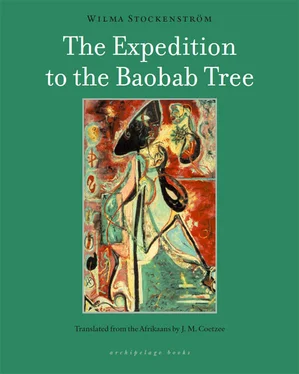Time passed and the plan of crossing the river was not carried out. Neither of the two had the inner strength to stand up, call the slaves together, and track down a hissing tree and set to work. In spiritless silence we lingered on the nearside bank. The food supply was now rapidly becoming dangerously low, spurring the slaves to set game traps of raisinwood and one festive day to cook a bustard for us.
What I could not understand was that the leaders’ obvious lack of resolve did not make the slaves think of quitting us. Every night they meekly allowed the eldest son to chain them together, a measure taken after the one with the money in his hair had escaped. Every night I would hear the rattle of their shackles as they turned over in their sleep. In the mornings the chains would be removed, and no longer neatly rolled up and stored away — no, they were simply thrown in a heap. It was as if we had all become dream beings in a transition to we knew not what. The days unfolded and closed again one after another.
The river remained a joy to the eye. We were in a place where there were saf-saf willows growing. The eldest son, or perhaps the stranger, had remembered that this was an indication of firmness underfoot should one wish to wade through the river. For such an undertaking we should most certainly have had to wait for winter, even the end of winter. I say so because one of the slaves was ordered to enter the water and see how deep it was. He walked unenthusiastically in till the water reached to below his armpits, then began to swim, and shortly thereafter we heard him cry out and saw the current bearing him along and fellow slaves of his running downstream to keep up with him, calling to him to struggle towards the bank. I saw his head bobbing further and further off on the surface of the water, and the further off the more it looked as if he were floating at his ease. Later his fellow slaves returned. Precisely where he drowned they could not say with certainty.
It was nice to observe the bee-eaters as they shot across the water after flying insects. The water itself was a brownish green and muscular, and lapped at the banks where rocks or tree stumps protruded. Of the willows only the tops stuck out. The limp branches hung half-drowned. I felt like the willows and let time flow through me. It was nice to hear the bush shrike whistle and never see him. We also grew accustomed to the cicadas.
The eldest son and the stranger recited poems to each other in solemn tones and asked each other riddles, me too, and once the eldest son sang in a wonderfully deep, rich voice. The stranger wanted to clap him on the shoulder in sincere admiration, but it was as if he did not like being touched, and jerked his shoulder away. He told of yearning for his bride. He called her name over and over like someone throwing a jewel from one hand to the other.
The stranger said: If the sky were now to smash down on us, we would scarcely make a dent in the turf.
He plucked a handful of lush grass from where he sat and chewed on it, and his eyes closed. He was dreaming. I put my arm around him. It no longer disturbed me that the eldest son could see our caresses. The slap of water soothed me like a refrain. I touched my ivory bracelet. Luck bringer. I kissed it. I had a swelling on my heel that was very painful, and of course mosquito bites all the time. What was that lonely bride left behind doing with her days where she sat without any tidings? What were people doing now in that city? Was there anyone besides the bride who remembered how we had departed?
Yet we did get to the far bank, and perfectly easily. A day’s journey upstream we floated a roughly carpentered raft out from among the reeds and finch nests, and seeing that an island divided the river into two courses at this point, neither flowing so fatally strongly, we arrived without loss of life or goods first on the island and then on the far bank, where we spent a day to get everything properly in order, to inspect and check over everything. One of the slaves killed an oribi, throwing a knobkerrie that he had carved for himself during our halt from the light yellow wood of the bush willow. With this welcome addition to provisions the expedition once again got into its stride.
Our pace was quickened. There was a noticeable air of urgency about the two leaders, an alertness long last seen, as if they had undergone a personality change under the effect of the scrap of news about the city in the red desert retailed to us by the hungers. Both now walked at the head of the procession, each taking longer steps than the other, striding more smartly than the other; one even heard them laugh. Their good humor infected all of us. It encouraged industry among the slaves, who, dividing the work more readily in an atmosphere of co-operation rather than supervision, in no way fell behind their owners. We felt jointly attracted by that promised city at the foot of the rose quartz mountain.
Still, I could not help notice how untidy we looked. From above, from my litter, last of all in the line, I was struck by our slovenliness. It could not be disguised that we looked dirty, worn down and shabby, dusty, our clothes full of fat stains. One of the slaves was no longer even carrying a pack on his head. How was that? What did he think he was doing here? Another had tied rattling round yellow seeds around his ankles that made suru-suru as he walked and one revealed himself to be a notable imitator of bird language, so that sometimes, after hesitating a while, birds whistled back to him in response to his call. It was funny to hear him talk.
I wonder how I looked to the other. A sorry sight but full of life at least?
How insignificant our little line of human beings among the tall rough grass stalks, a wholly inconspicuous phenomenon in the midst of frisking herds of zebras and wildebeest and redbuck, and the ever-amazed ostriches. We entered upon highlands where the air was fresher and the wind unceasingly bent the tops of the grass and bush and trees, a billowing in the grass, a jerky nodding from the bushes and a stately response from the trees. The loose hanging stems of creepers swung helplessly about. Their magenta trumpeter flowers peered tremulously yet archly from every level of the host tree. In these more open plains the clouds floated in the blue, independent of each other and came together only at odd times, as if called, to manufacture thunder and lightning and dissolve in rainshowers. We took shelter under trees and waited till they passed. It was colder here. We moved on, a shifting tableau through the days.
After the city in the distance which must be the intended city, which would have to satisfy all expectations, on which we pinned our hopes, for whose sake we exerted ourselves, mustered our forces, had reorganized ourselves, where we would find shelter, meet people, streets with people, buildings, markets, squares, windows full of smiling women, children in gardens.
The city — so said the hunters who had advised us to use the raft they had made for themselves from tree trunks and rushes and left lying among the reeds where the island divided the great river — the city lay swept by the wind in a red desert. Sunbaked red walls. And behind it on the horizon rose the rough jagged rosy peaks of the mountains.
And behind them? asked the stranger.
And behind them the sea.
Ah … The sea.
A slave had been the first to notice the hunters. We felt embarrassed that we could offer them so little in the way of food and drink. Actually they were better off than we were, as we soon noticed, and also much better organized. They were carrying their booty of elephant tusks back to their kraal and were in a hurry because they had been away longer than they had planned. Summer was marching on. The elephants, they explained, had migrated further than usual, thus they had had a long search for them, but patience and endurance had been rewarded. Contentedly they indicated the bundles of tusks. This raw form of ivory looked rather ugly to me, particularly the blunt ends cut out of the flesh, and the texture of the tusks did not look at all like what I wore on my arm. Yet it was claimed that the ivory of this region was of far higher quality than the ivory of elephants hunted beyond the sea from our city. How should I know?
Читать дальше












